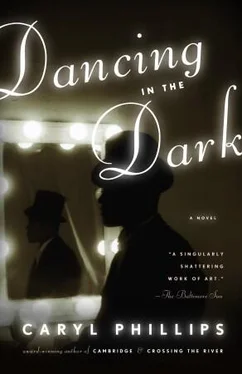“You sure you want to marry to this man?”
“Of course I’m sure. I’m thirty-four years old, and nobody ever accused Charlotte Louis Johnson of not knowing her own mind.”
A silence descends between them and Lottie feels guilty for having spoken so sharply. She looks at Ada, who is now concentrating on the floor beneath her feet.
“Ada, if you’re concerned that I haven’t finished my grieving for Mr. Thompson, then you can quit your worrying. Sam was a businessman in all things, including his marriage. He took good care of me, and made sure that I didn’t want for anything, but Sam’s gone, and I’ve done my share of lamenting on account of my late husband.”
Her friend looks up and meets her eyes.
“Lottie, I only want what’s good and right for you, but since I started to see George I noticed something about the both of them. Fact is they’re already married to their work. All they ever think about is what they need to do to make Williams and Walker even more famous. I mean, do you think that either of them are really going to lose any sleep troubling themselves over us?”
The street noise begins to rise now as the day matures. She understands that Ada means well, and a part of Lottie wants to reach out and hug her. But on this most special of days what she desires more than anything else is for Ada to wish her unconditional joy and happiness. However, Ada continues to sit marooned in her own circle of frustration and Lottie stares blankly at her friend and tries not to let Ada’s words or behavior cloud her second wedding day. She already knows that her husband-to-be is an ambitious man, and she has already discovered that beyond his declarations of affection for her he has difficulty sharing his feelings. But he cares, that much she is sure of, and in spite of Ada’s words of caution she believes that the future is theirs for them to make together.
Ada walks briskly up Seventh Avenue, threading her way neatly through the morning rush of pedestrians. She feels guilty for she knows that her visit has unsettled her friend, but after the wedding there will be ample time for her to repair whatever damage she has wrought. Right now she must hurry and collect her new dress. When she reaches Fifty-third Street she looks up at the tracks of iron that stride through the air above her, and then she hears the sound of the train as it thunders its way in her direction. The smooth majestic turn to the east has already taken place on Ninth, and as it now enters the block between Sixth and Seventh it begins to slow down and make ready for the sharp turn south on Sixth Avenue. Ada crosses the street, preferring not to walk beneath the train as its brakes begin to screech. Superstition, she knows, but she backs into a doorway and waits. As the train passes from view the acrid, soot-laden air blows into her face. Fifty-third Street may be the center of colored American life, the main street of black Bohemia, but Ada has never felt truly comfortable on these dark blocks that are shadowed with the latticework of the El.
He slips the ring neatly onto her finger, it requiring neither pull nor push for he has been careful to ensure that it is the right size. Whenever he held her hand he surreptitiously measured her ring finger with the tips of his own delicate fingers, and she smiled imagining that his subtle squeeze was nothing more than that — a subtle squeeze. She angles her face up toward his and he leans down and for the first time he publicly tastes those lips. Cherry. She tastes like cherries, and a smile lights up his face. He raises his eyes and looks across at George and Ada. He is kissing his wife, and on this special day she tastes like cherries and he is happy for he loves cherries.
His marriage surprises the ambitious colored men of Marshall’s Lounge, for they never imagined him to be a kinsman who revered women. In fact, nobody can remember a time when they’d ever witnessed him with female companionship, but George, who has known him longer than anybody, refuses to offer up an opinion on the subject even though Bob Cole and Ernest Hogan buy extra drinks and try to encourage him to talk. But George remains steadfastly silent, and the newly married couple move into a large room at the top of the hotel and thereafter pretty much keep to themselves. Sometimes Bert will sit out with George and smoke a cigarette and plan what their next move might be, and occasionally they are joined by the industrious Will Cook and his impatient partner, Paul Dunbar. All four of them believe that legitimate musical entertainment is the way forward for the colored man, and they spend their days writing songs and sketches and their nights speculating about the future. An excitable George will sometimes whisper in his partner’s ear that Cook and Dunbar are the men who are definitely going to rescue them from the New York City vaudeville circuit, and if they are ever going to be more than Two Real Coons then they ought to listen to these men. And so they listen to Dunbar’s fiery talk, and they tune in to the silvery melodies that Cook hammers out on the piano in Marshall’s Lounge, but they are not the only ones who are paying attention. Bob Cole and Ernest Hogan sit around with their expensive drinks and their ostentatious cigars, and they also give ear to Cook’s melodies and Dunbar’s versifying for despite the crude limitations of their own minstrelsy they too have dreams of stardom. Bert is soon convinced that Cook and Dunbar are indeed the key to their future, and although he has recently married, he too learns to stay up late. As the men’s voices soar louder with each late-night round of drinks, Bert discovers how to make his own contribution to the proceedings, adding an erudite point here or a powerful suggestion there as he stabs the air with his cigarette. He is avoiding something; they all know it, but nobody, not even George, will speak of this directly. Together with Cook and Dunbar, the four men intensify their planning and arguing, and they squabble over the virtues of the cakewalk, and which theaters a colored performer ought best to avoid, and whether coon songs really do bring down the race, and how much a man can think or feel beyond the mask, but nobody asks Bert why he is not upstairs with Lottie, who they know regards the habitués of Marshall’s Lounge with a barely disguised contempt. Bert’s world is dividing into two, and it is clear that at some point a decision will have to be made, but this is his own private business and it has nothing to do with anybody else; not these men, not George, nobody.
She lives now by candlelight, alone, propped up in bed with a book, waiting for her husband to shamble his way upstairs and into a body-warmed bed. She has rekindled her interest in romantic fiction and she understands that in order for her marriage to survive they will have to find a place of their own, far from this hotel, for this man is certainly not levelheaded Mr. Sam Thompson, businessman. She has married a performer, albeit a special kind of performer for her new husband appears to be pained by his profession, but she attributes this anxiety to his having come from the islands. They are a different people, that much she now appreciates, and for them the problem of being colored in America appears to engender a special kind of hurt. But there is something else troubling her husband, a torment that she cannot fathom. At night, in their bed, he recoils from her touch, and his eyes brim with tears at the slightest woe. Now that they are married he calls her Mother, but she does not have the heart to ask him to discover an alternative word for she instinctively understands that he has no other. She would prefer Lottie, or wife, or darling, for Mother instantly reduces her to something less than a woman, but she imagines that in some part of his unconscious this is probably how her husband now regards her. As being something less than a woman, a companion perhaps, or a new extension to the family, but certainly not the trusted bedrock upon which he will build the rest of his life. This one inappropriate word, Mother, speaks to the crisis in both their lives. Reading alone in their room at the top of Marshall’s Hotel, she now realizes that she has taken on a new, and onerous, responsibility and perhaps Ada had been trying to warn her about this. As she leans over to blow out the candle it strikes her that despite many years of contented marriage to Mr. Sam Thompson, there are things about the souls of men that she has yet to learn; in fact, it is possible that Ada understands men and their ways better than she does. The room plunges into darkness and she admits to herself that it has never crossed her mind that Ada might be better acquainted than her with anything, beyond dancing.
Читать дальше












